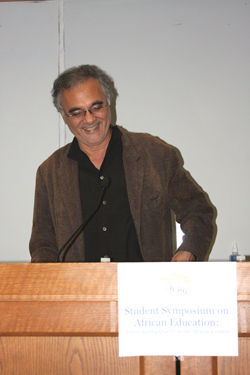Talking About Education in Africa
A TC student group convenes an inaugural symposium for scholars and students
“I’m not a scholar of education, so what am I doing here?” Mahmood Mamdani asked his bemused audience as he began his keynote address at the first Student Symposium on African Education at Teachers College on February 27.
Mamdani might not be an education scholar, but as an expert in African history and politics and Professor of Government and Anthropology at Columbia University , he was more than comfortable discussing how history and social change have framed educational policy in Africa .
Mamdani’s speech was the culminating event of a full day of discussions among students and scholars from TC and elsewhere about Africa and its evolving educational systems. The symposium was organized by the College’s African Studies Working Group (ASWG), which numbers some 25 TC students.
Besides offering a chance to exchange research and ideas, the goals of the conference were simple, according to its organizers. “It’s a chance to network, make connections and for graduate students to practice presenting in a less formal environment,” said doctoral student Annie Smiley, a conference organizer and panelist, who has been an ASWG member since its founding in 2003.
The idea of putting on a conference came to Smiley and ASWG Co-chair Chidimma Agwu-Jones, a master’s degree student in the International Educational Development Program, last spring after another TC student group, the Association of Latin American Scholars, organized its sixth annual conference.
“We thought: If they can do it, we can too,” Smiley said.
And so they did.
After welcoming remarks by Portia Williams, TC’s Director for International Affairs, who herself spent more than six years directing education and development programs in East and Southern Africa, panel sessions throughout the day covered a wide range of educational issues facing the continent, including improving school quality, alternative approaches to teaching and learning, and universal primary education. With more than 50 countries spread across the African continent, it was impossible to cover them all in a day, Smiley said. Nonetheless, panelists discussed developments and educational initiatives in countries from Mali to Zambia , Nigeria to Mozambique
“There was a great deal of enthusiasm about the event. A lot of people networked and made connections that will last beyond the conference,” Smiley wrote in a post-conference e-mail. “And I think we helped establish TC as a major center of scholarship on African education.”
“Overall, it was a great symposium,” Agwu-Jones said. “We look forward to planning another one next year.”
Published Monday, Jun. 1, 2009
